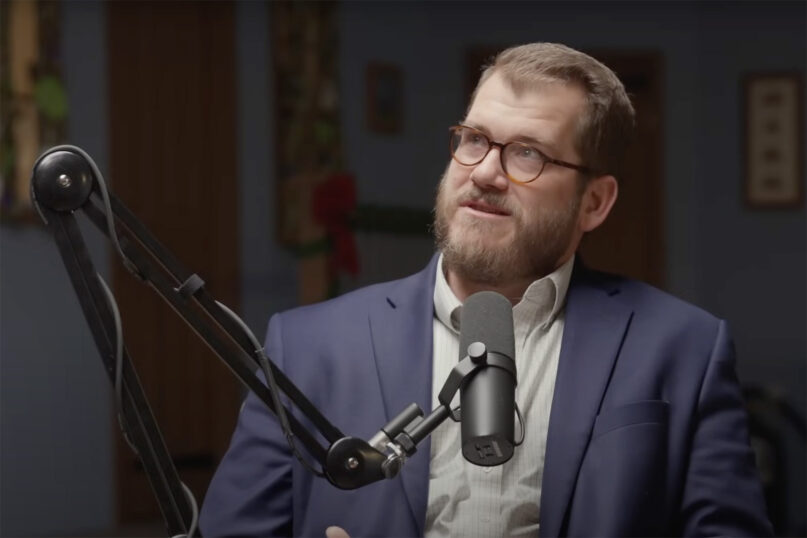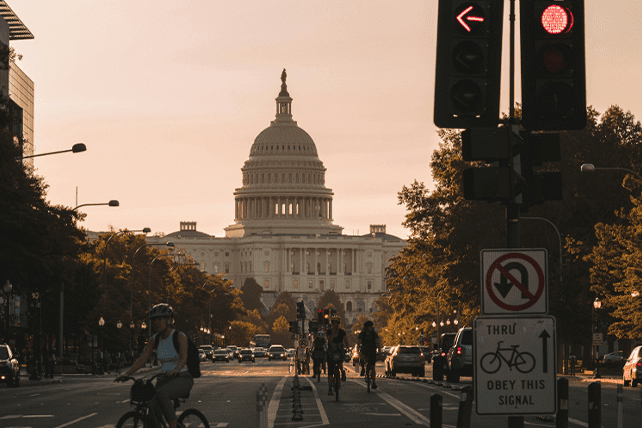WASHINGTON (RNS) — Pastor Jared Longshore isn’t exactly a holy roller preacher. Bearded and bespectacled, his sermon before the D.C. plant of Christ Kirk church on Sunday (July 13) was delivered in the subdued, heady style typical of the often buttoned-up Reformed Christian tradition.
But as Longshore stood underneath an American flag suspended just above his head, its stars and stripes facing toward the floor, the pastor made clear that the new congregation — an outpost of an Idaho church run by a self-described Christian nationalist — wanted to make some noise.
“We understand that worship is warfare,” Longshore said, leaning over the lectern. He paused for a moment, then added: “We mean that.”
Many in the roughly 120-strong congregation nodded in agreement, a few fanning themselves with church bulletins as they sat packed together in the small, non-air-conditioned room just a few blocks from the U.S. Capitol. And the message appeared to resonate with the most notable attendee among the crowd of worshippers: U.S. Secretary of Defense Pete Hegseth. Children in the pews whispered excitedly when Hegseth entered, and the defense secretary was mobbed by supporters as he left the church.
While the service itself followed the traditional rhythms of Reformed Protestant liturgy — confessions of faith, Scripture readings and hymns sung in harmonies that emphasize fourths and fifths — Longshore’s sermon was full of political references. He lauded the Department of Government Efficiency and argued that liberty and equality are concepts that only make sense if they are attached to conservative Christianity.
“If you get rid of God, you lose all sense of what equality is,” Longshore said.

Pastor Jared Longshore. (Video screen grab)
The church plant is the latest example of pastor Doug Wilson’s growing sphere of influence among a cadre of conservatives sometimes described as the “New Right.” Having founded Christ Kirk (also known as Christ Church) in Moscow, Idaho, decades ago, Wilson has since helped establish a small denomination — the Communion of Reformed Evangelical Churches — while also creating a Christian school, college, seminary and printing press. Along the way, the stridently conservative pastor has sparked a number of controversies, from his blatant use of anti-LGBTQ+ slurs to his comments downplaying the atrocities of American slavery.
But Wilson’s political rise is more recent, tied mostly to his congregation’s headline-grabbing protests against pandemic restrictions and the pastor’s fervent, unapologetic embrace of Christian nationalism on his various YouTube channels. The result has been a flurry of prominent politically themed speaking engagements in the past two years, such as speaking alongside Russell Vought (who would go on to be the director of the Office of Management and Budget) at an event hosted in a U.S. Senate office building; addressing the crowd at a Turning Point USA conference; or speaking on a panel at the National Conservatism Conference.
RELATED: The Second Coming of Doug Wilson
Hegseth, who has praised Wilson’s books, said he moved to Tennessee specifically to enroll his children in a school associated with the Christian education movement popularized by Wilson. He also became a member of a local CREC church in the area. In May, Hegseth had his pastor, Brooks Potteiger, lead a prayer service at the Pentagon.
In an interview with Religion News Service, the Idaho-based Longshore — who is one of many pastors associated with Christ Kirk and the CREC slated to preach to the D.C. startup until it installs its own pastor — dismissed the idea that the church was part of an effort to influence D.C. politics in an explicit sense. He echoed Wilson, who has said the nation’s capital is now home to many members of the CREC denomination, and denied that Hegseth had any role in bringing the church to Washington.
But Wilson has also stated publicly that establishing the church is part of an effort to capitalize on “strategic opportunities with numerous evangelicals who will be present both in and around the Trump administration,” and Longshore acknowledged the effort is designed to be an indirect form of politicking.

